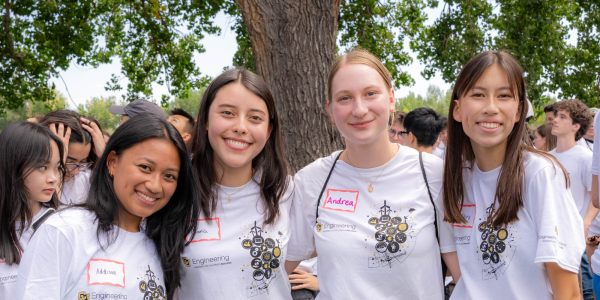Building on its commitment to improving the university’s recruitment and retention of students, staff and faculty this year, the��IDEA Council��has proposed a program that will facilitate faculty and staff participation in campus affinity groups.��
Since October, council members have met to review and prioritize recommendations in the��Inclusion, Diversity and Excellence in Academics (IDEA) Plan, the campus’s blueprint for building a more diverse, equitable and inclusive campus community. ��
The council in February proposed the establishment of formal structures for faculty and staff affinity groups, which would be open to all employees and center around shared identity, common bonds and a commitment to the perspectives of historically marginalized or underserved people.��
�ճ����Office of Diversity, Equity and Community Engagement��(ODECE) will lead in establishing the program in collaboration with campus partners and with the support of Chancellor Phil DiStefano and other campus leaders.��Foundational to the groups will be opportunities to connect and build affinity during community gatherings and to access information and resources.��
“The goals the IDEA Council has set for this initiative are in perfect alignment with our efforts as a campus community to build a better experience for our faculty and staff,” DiStefano said. “I applaud the council’s work in support of this proposal, and I look forward to receiving an update from ODECE this spring.”��
Bob Boswell, vice chancellor for diversity, equity and community engagement, said ODECE looks forward to moving ahead with the proposal to establish affinity groups for faculty and staff.��
“As the campus hub for these groups, we are working with the IDEA Council and other campus partners to establish group guidelines and resources that will help to deepen connections and build bridges amongst the campus community,” he said.��
When fully established, the groups would support faculty and staff who desire to meet regularly with colleagues from similar backgrounds and with similar professional goals. IDEA Council Co-Chair Teresa Hernández said affinity groups provide powerful opportunities for faculty and staff to continue with or establish a deeper sense of connection and community engagement.��
“That can include building community and relationships alongside individuals with whom we find commonalities based on shared identities,” said Hernández, a diversity, equity and inclusion search and outreach program manager for��Human Resources.��
Donna Mejía, an associate professor in the��Department of Theatre and Dance��who also teaches women and gender and ethnic studies, and Amy Moreno, director of inclusive culture in��the��College of Engineering and Applied Science, helped develop a proposal for establishing the faculty and staff affinity groups.��
Mejía noted that most faculty members conduct research, write, design, create and teach autonomously, which can compromise their ability to collaborate and truly connect with each other and create “a staggering sense of isolation.”��
“Affinity groups profoundly humanize and��dimensionalize��our environments, creating space for our whole selves to nourish with reflection,” she said. “For me, connection, belonging and friendship are not primarily a strategy for retention, they are the foundations of a meaningful life.”��
CU Boulder faculty and staff have met informally for years to create a sense of belonging, to support each other in meaningful ways and to improve the campus culture, Moreno said. The university’s sponsorship of affinity groups “signifies an acknowledgement of all of the labor, emotion and efforts that many have been pouring into our campus community” for the past several years, she added.��
New employees will be able to more seamlessly learn about and join communities that often recognize and validate important aspects of their social identities, she said.��
“Retaining staff and faculty involves a��campuswide��commitment to impactful initiatives, like affinity groups, to demonstrate we value each employee and are designing a community that is actively pursuing greater equity and inclusion,” Moreno said.��
In February, council subcommittee members named their forthcoming discussion items, which include enhancing resources for��CU LEAD Alliance��student success programs; expanding staff professional development opportunities with a focus on frontline service and classified staff; and strengthening mentorship opportunities for junior faculty.��
Over the long term, the IDEA Council will continue to play a key role in helping to shape the campus’s diversity, equity and inclusion goals, said Lisa Flores, who co-chairs the council and is the associate dean for diversity, equity and inclusion in the College of Media, Communication and Information.��
“We are aware of and want to be attentive to the campus community’s desire to see immediate change on a lot of different fronts,” Flores said. “As a council responsible for this important charge from campus leaders, we also want to ensure we are bringing forth the right set of recommendations this year through a collaborative, thoughtful process.”


